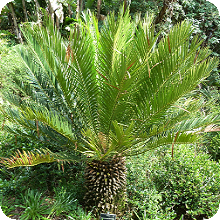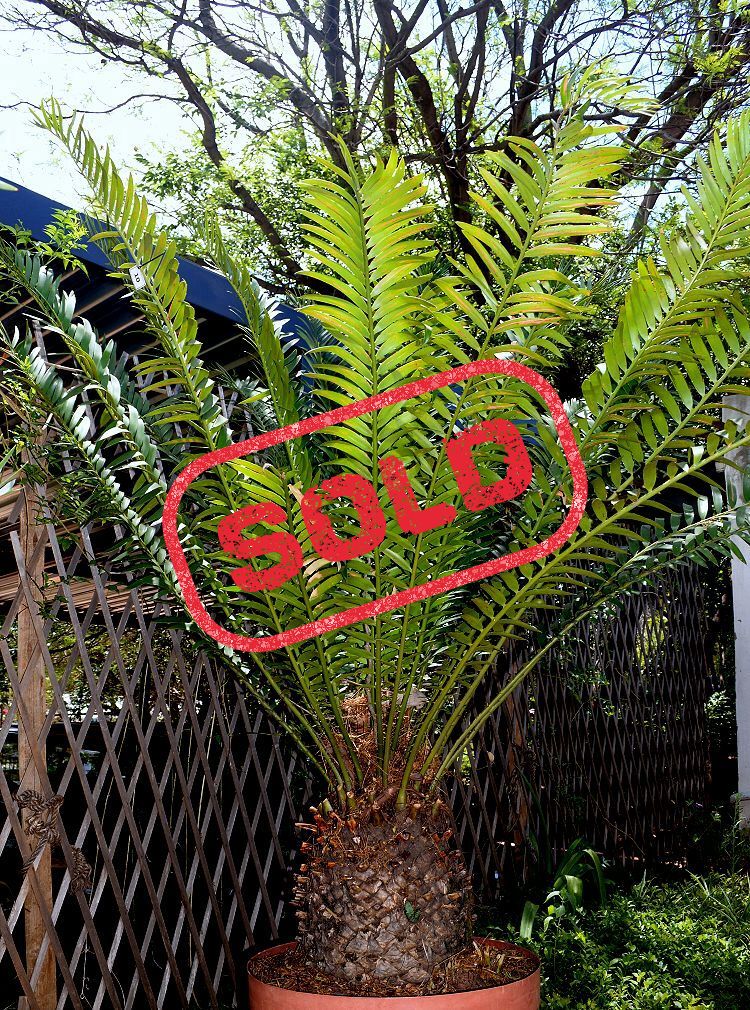|
| Division: Cycadophyta |
| Class: Cycadopsida |
| Order: Cycadales |
| Family: Zamiaceae |
| Genus: Encephalartos |
| Species: E. senticosus |
Conservation Status: |

E. senticosus
Jozini CycadEncephalartos senticosus is a quick-growing, glossy dark green giant cycad, also known as the Lebombo, Jozini cycad (Eng.); lebombobroodboom (Afr.); isigqiki-somkhovu, ujubane (Zulu); sijekwane (Sotho). This species occurs from south of the Jozini dam in Northern KwaZulu-Natal in South Africa northwards along the Lebombo mountains to just north of Siteki in Swaziland. Plants are also found on the Mozambique side of the border. Recorded from 300 to 800 m.
This frost-hardy cycad prefers subtropical to warm climates and, as in many cycad species, it appreciates being planted in well-drained soil in sunny and partial shade areas.
Encephalartos senticosus is a quick-growing cycad, up to 4 m high and with a stem of about 300 mm in diameter. The stem is covered by remains of leaf bases, and has a woolly crown. The leaves are of medium size, about 1.1-1.8 m long, rigid and straight to somewhat arched and glossy dark green. The rachis (the axis of the leaf) is yellow and the leaflets are smaller in size towards the base of the leaf. They are hard, narrowly ovate and toothed, with the apices forming spines.
The cones are 3-4 per stem, usually appearing in December. The male cones are narrowly ovoid, orange to orange-yellow, on short stalks up to 100 mm, and covered by tawny, felt-like hair. They shed the pollen in April and May.
The female cones are ovoid and pale to bright yellow. The exposed surface of the cone scales is smooth and raised pyramidally. The cones disintegrate spontaneously from September to October, each yielding 280-590 bright red seeds.
Cultivation:
Encephalartos senticosus grows relatively easily in a home garden and is frost resistant. The species prefers subtropical and warm temperate regions. Give it a well-drained soil in full sun or partial shade. Keep seedlings in shade much longer than those of the closely-related species E. lebomboensis (Mananga form).
In suitable conditions E. senticosus grows very rapidly, reaching an appreciable size within 5-10 years. Seeds germinate about one year after having been released. E. senticosus also makes a good container decoration plant.
| semi-shade | dark green | low watering | fast growth | frost-hardy | common |
Encephalartos senticosus grows relatively easily in a home garden and is frost resistant. The species prefers subtropical and warm temperate regions. Give it a well-drained soil in full sun or partial shade. Keep seedlings in shade much longer than those of the closely-related species E. lebomboensis (Mananga form).
In suitable conditions E. senticosus grows very rapidly, reaching an appreciable size within 5-10 years. Seeds germinate about one year after having been released. E. senticosus also makes a good container decoration plant.
E. senticosus for sale at AfricaCycads.com:
|

